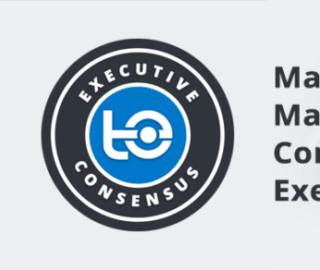
In the last 12 months, Montreal has arrived on the world stage as an epicenter for machine learning and artificial intelligence. The city’s extraordinarily high density of AI talent isn’t new, but the demand for machine learning is, and the proverbial “tech spotlight” is now shining bright on this very French Canadian city.
In just the last few months:
- The Canadian government is funding a Pan-Canadian Artificial Intelligence Strategy, including $125MM in investment
- Monteal’s Element AI (an applied AI lab / AI services firm) raised an impressive $135MM to bring cutting-edge AI into the enterprise in June 2017
- In September 2017, Facebook launched its AI research lab in Montreal – headed by McGill University’s Dr. Joelle Pineau
the city’s unique confluence of academia and international accessibility has primed it for what seems to be a breakthrough – at least in terms of tech and AI spotlight. Some are going so far as to say that Montreal might just become the next Silicon Valley, especially in an American political climate hostile to the international cooperation on which research institutions and tech companies thrive.
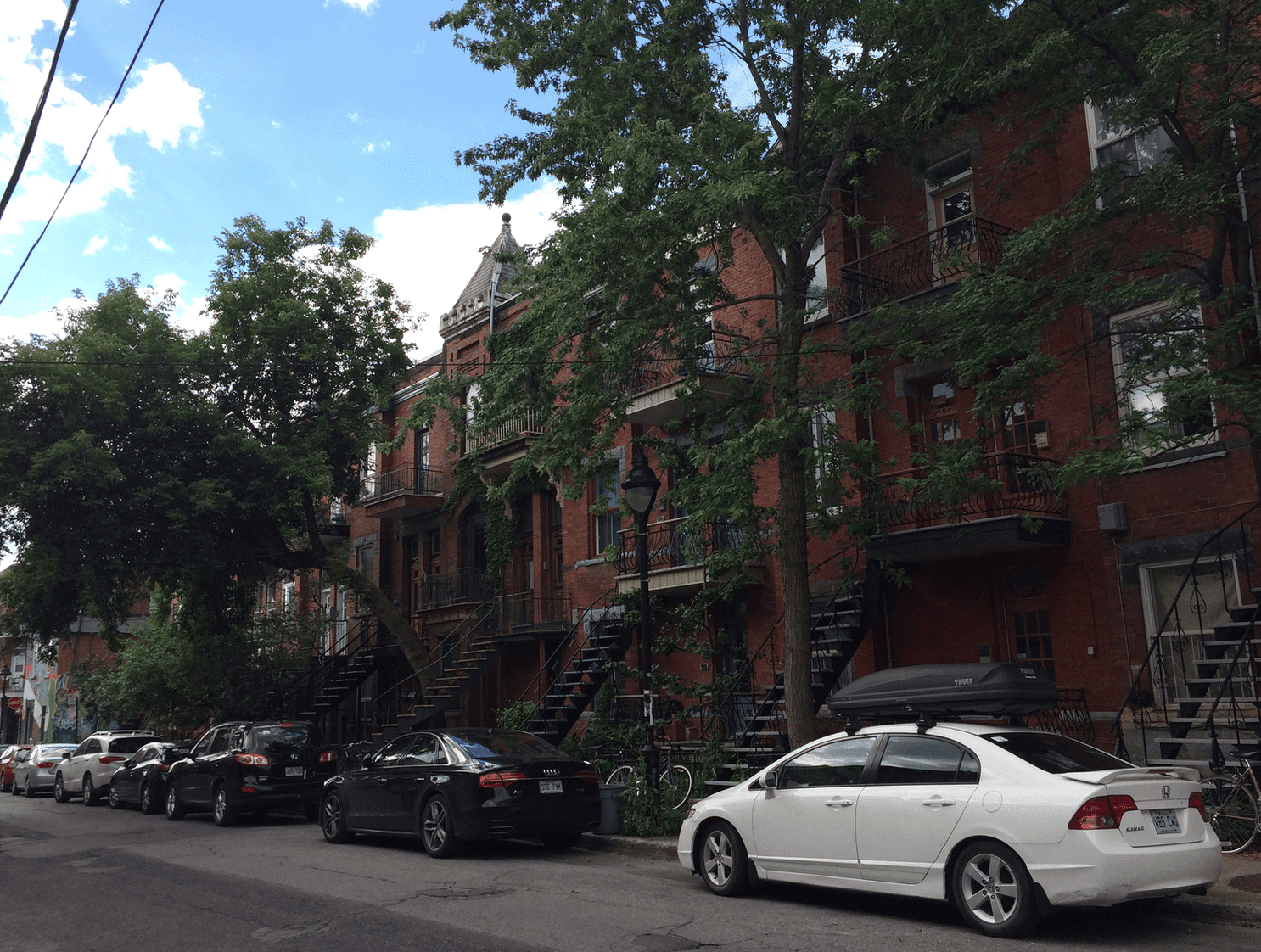
In order to figure out what exactly would attract and excite investors and fresh talent away from Silicon Valley and to a city hundreds of miles away from tech giant headquarters, we explored the recent changes in the city’s entrepreneurial and AI scenes over the last two years by interviewing over a dozen Montreal-based researchers and AI executives.
I personally spent about 12 days roaming the city, meeting with 2-4 AI executives a day, and getting the low-down on how the Montreal AI scene is affecting business for big firms and startups. In July (the month of my visit), Montreal is gorgeous, and the backdrop of hip coffee shops and quaint, vine-covered architecture made the trip all the more enjoyable – so I’ll be sure to include some photos of the trip throughout this article.
Looking at both the pros and cons of the recent uptick in attention, this is an article for those who are looking to invest (be it their talent, their time, or their money) into the burgeoning machine learning hub of Montreal.
We did our best to organize our breakdown of the Montreal AI scene into the following sub-categories:
- Montreal Machine Learning Ecosystem – Changes in the Last 2 Years
- Investment Ecosystem of Montreal – Changes in the Last 2 Years
- The Impact of French Culture
- Montreal vs. San Francisco – Location Considerations
- Hopes to Montreal’s Future in AI and Innovation
Feel free to skip ahead to the corresponding sub-section in the article below to see the quotes and insights you’re interested in:
Montreal Machine Learning Ecosystem – Changes in the Last 2 Years
Fortune has smiled on Montreal in more ways than one – and in some ways unpredictably.
For about 60% of the Montreal AI folks I interviewed (including executives and researchers), the sudden and intense takeoff of machine learning in the last five years has come as somewhat of a surprise.
The general trend that I’ve found is that businesses or persons who are more established (more employees, more news coverage, etc) tend to provide answers that are more PR-polished. This makes sense, and this same pattern happens constantly in business, science, government, and more.
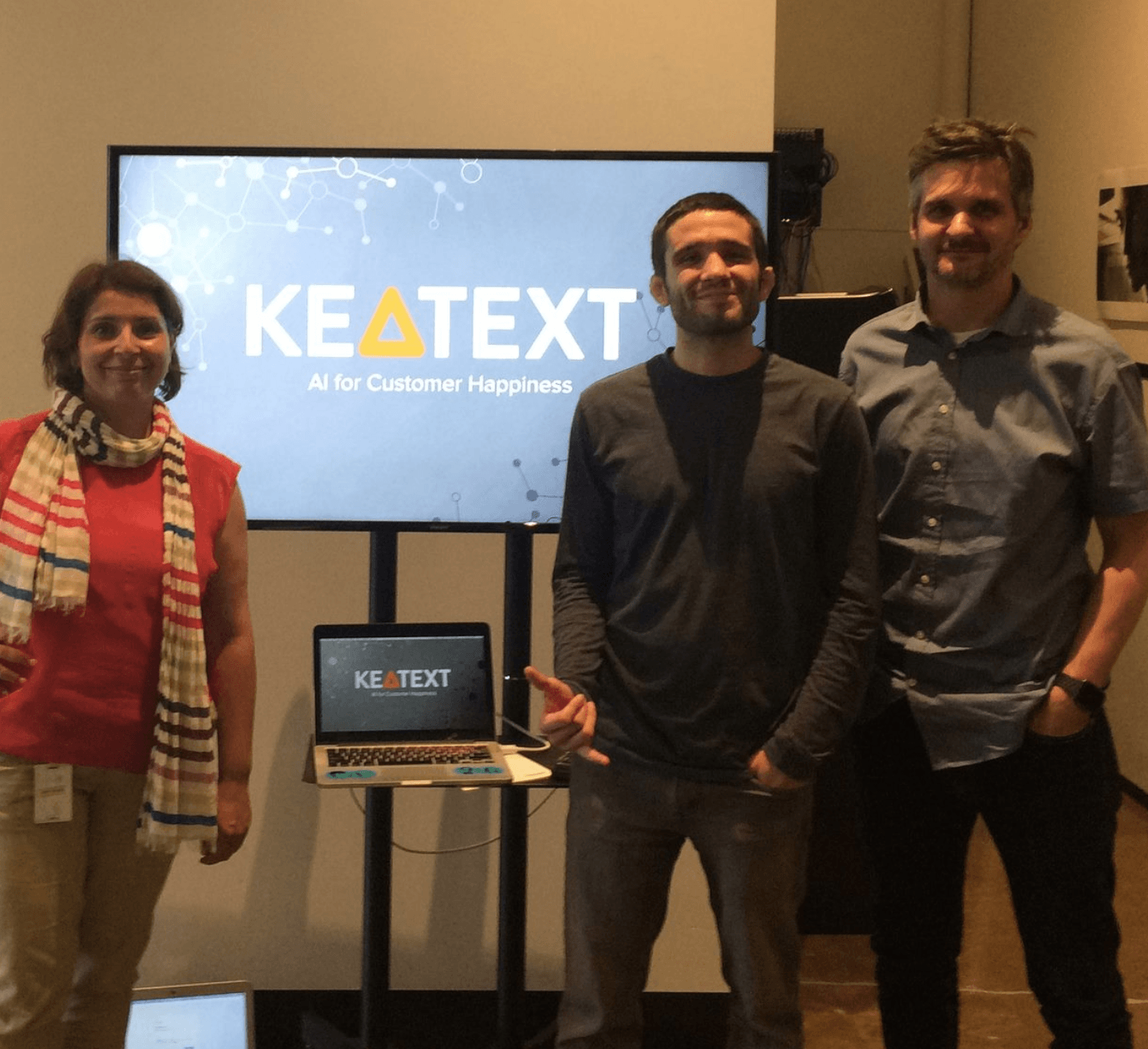
For companies with under 20 employees, AI PhDs seem to be quite frank about how out-of-the-blue the prominence of machine learning really was. Those with larger firms may prefer to appear to have known all along that this transition was inevitable.
What everyone agrees with is the importance of the academic focus on machine learning in Montreal.
Among the most important reasons that top talent in the AI field may locate to Montreal is the thriving academic scene centered around the University of Montreal, with it’s Montreal Institute for Learning Algorithms (MILA) as one of the centers of attention in the academic deep learning scene. MILA claims to be the world’s largest academic deep learning lab in the world.
Out of everyone we spoke to, no one summed up this sentiment quite as poignantly as Erudite.ai’s Chief Technology Officer, Patrick Poirier, when he said:
“What makes AI talent really excited and interested is a real technical challenge and [the ability] to publish papers…or to do something good for humanity…Trying to fight for talent with pure cash is a losing bet for startups in Montreal.”
As an example, Patrick mentions how Canadian AI research company Maluuba recruited talented individuals with the promise that they could do research with the company (Maluuba was acquired by Microsoft in January 2017).
If this sentiment rings true, Montreal could have quite the advantage when it comes to attracting talent to the city’s AI scene.
Dr. Yoshua Bengio is one of the world’s leading deep learning researchers working at the University of Montreal, where he heads MILA.
A few of the researchers we interviewed spoke about how Bengio’s presence alone is reason enough for talent to locate to Montreal. While in 2012 or 2013 “Geoff Hinton” would probably be the only AI researcher to ring a bell for most of Silicon Valley, Montreal’s Yoshua Bengio and NYU’s Yann Lecun have gained “top of mind” status in much of the tech world.
In our last correspondence with Dr. Bengio about the Montreal AI scene in the last two years, he replied – as one might expect – with an assured confidence:
“Montreal has the largest concentration of deep learning academics in the world. This attracts some of the best students, post-docs, professors, researchers, engineers and entrepreneurs interested in contributing to the ongoing AI revolution.”
One might imagine that the Bay Area (not only in it’s universities, at tech giants like Google and Facebook, who have their own significant AI research centers) might also be in the runnings for deep learning researcher density, but I wasn’t able to find numbers.
While I was unable to find any all-encompassing research to find relative densities of deep learning researchers by city, it’s rather clear the MILA is one of the preeminent places to learn machine learning, and the growth in the Institute (including recent investments of millions of dollars from both Google and the Open Philanthropy Project) seem to bode well for Montreal. Maybe sometime soon someone will actually “crunch the numbers” on researchers by location.

(Note: We conducted a full-length interview with Yoshua Bengio titled “The Rise of Neural Nets in Our Daily Lives”, which may be of interest for readers interested in understanding the basics of machine learning and deep learning.)
Vince Iannotti of Nuance – a global AI company with a major footprint in Montreal – mentioned that one of Montreal’s strengths was the fact that its world-class talent is “less mobile” and “wants to live close to and stay in the city” because of the culture, lifestyle, and comparatively low cost of living. Nuance has cultivated an active internship program in the area to get their hands on this local talent (which we might guess was a smart move based on the recent efforts of Microsoft, Google and Facebook moving into the area in recent years).
This convergence of talent has been going on for over a decade now, but only recently has the press caught onto the potential of this melding of the minds.
Narjes Boufaden, founder of Keatext, a software company that claims to help businesses audit customer feedback through machine learning, claims that even back in 2005 “there was a really great asset already there because of the academic level with Yoshua and his students. There was something happening, but it wasn’t all that well-known.”
That something has attracted over 150 AI researches to work in Montreal universities. This level of academic interconnectedness helps attract a slew of talented individuals from all over the globe.
Ritika Dutt of Botler.ai (who previously held a position at the Notman House, one of Montreal’s main tech hubs) likens the sentiment around AI as a “goldrush,” a kind of enthusiasm that not draws people from elsewhere, but also charges up the enthusiasm of locals. In Montreal, many of these locals are already experts in machine learning (thanks again primarily to the influence UMontreal).
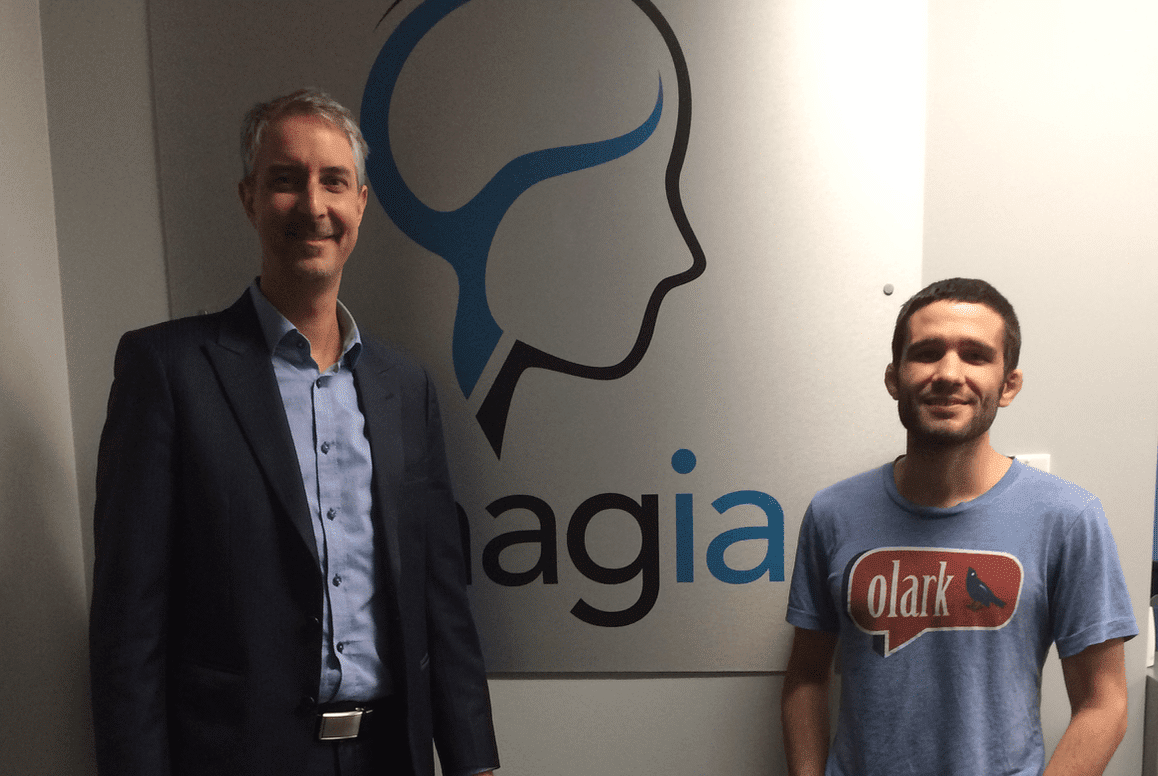
Dr. Alexandre Le Bouthillier, founder of Imagia (a machine vision healthcare company), claims that the talented minds operating in Montreal’s AI space are mostly foreign-born: “We have people from Italy, Iran, etc.” Le Bouthillier’s own team hails from all over the globe.
We think Dr. Le Bouthillier astutely points out, “Smart people know that talent attracts talent.” If you’re looking to find the next successful region in any field, get an idea of the talent concentration in that region. He confirms that this influx of talent (and the accompanying attention from Facebook, Google, and Microsoft) has also let to raising salaries – a natural effect of supply and demand.
Helge Seetzen, CEO of TandemLaunch, a self-proclaimed “startup foundry” based in Montreal, describes the multinational nature of the Montreal AI scene in relation to the impact the recent spotlight has had on it:
The Impact has been mildly positive as a net. In part that’s because we are not really Montreal. We are extremely international in everything that we do: fundraising for AI, talent acquisition for AI—both are a bit easier. You don’t have to explain AI or deep learning from scratch anymore. Our people come from everywhere; our technologies come from everywhere. Our fundraising and talent and IP…it’s all from outside Montreal.
The international community thriving in Montreal’s AI scene owes itself to a political climate that is much friendlier to immigrants than that of the U.S. According to Matt Fogel, founder of Fuzzy.ai, “the political climate in the US is deterring some folks from certain nations from going to the US… and Canada might be better option.” Fogel even claims that Canadian ex-patriots are moving back to Canada from Silicon Valley as a result of the political climate. All in all, the political situation going on in the U.S. seems to serve tech hubs like Montreal rather well.
In fact, some consider the current political climate in the U.S. an opportunity for Canada to take the reigns as a North American leader in the AI world. Jeremy Barnes, Chief Architect at Element AI, believes “the playing field is more level now…we don’t have to compete at a disadvantage anymore. We are part of North America here, too.” He suggests:
What kills a startup is managing risk. The problem is that immigration is not controlled by companies. It’s hard to control and predict. Canada’s is much more stable and predictable.
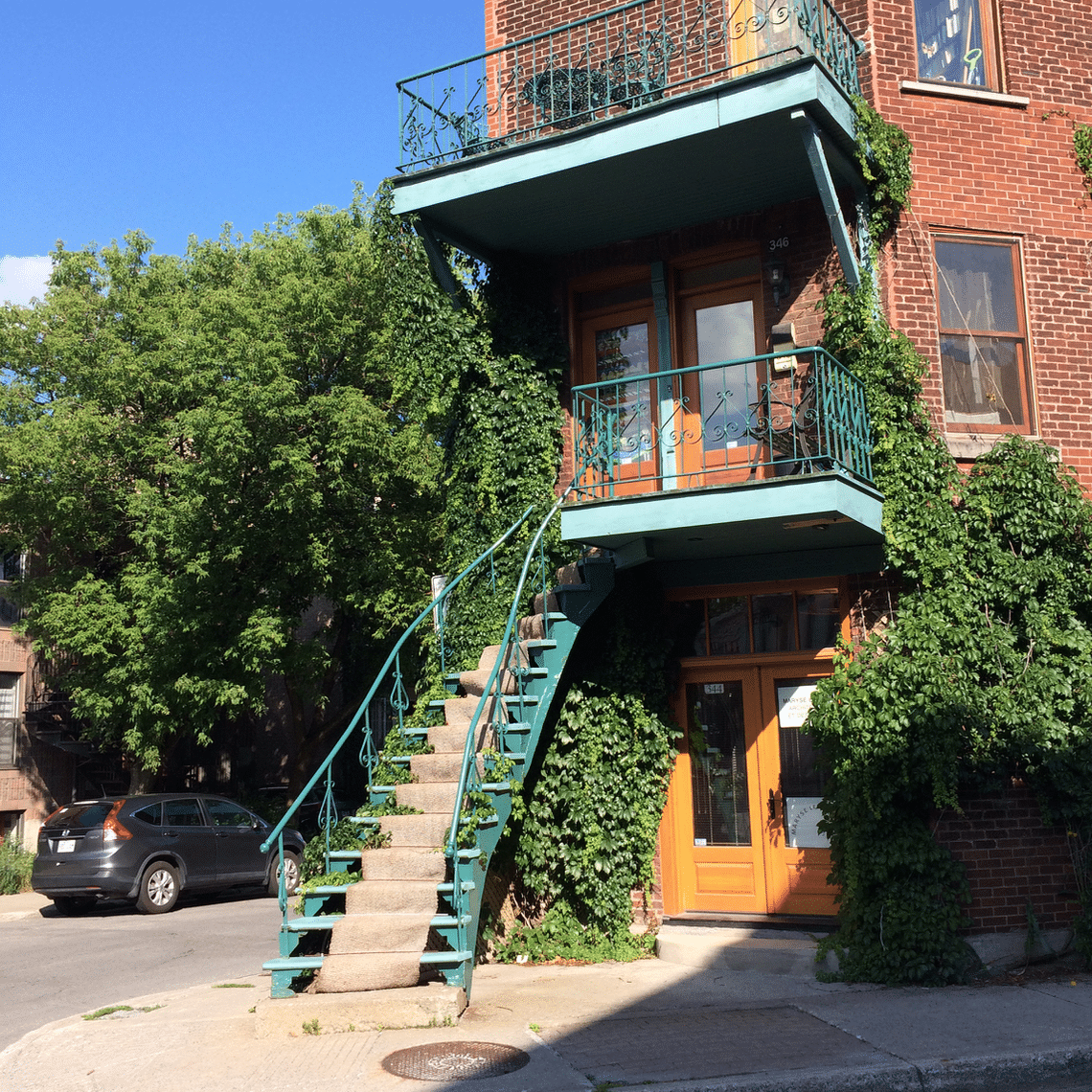
Denying entry to immigrants can cause significant barriers for research institutes and companies looking to bolster their ranks with talented individuals or find interested investors.
Lexalytics president Mauricio Padilla suggests that Canada is being “rediscovered.” He claims to see less talent moving to the States and more moving into Canada.
Clearly Montreal has been a thriving research city for quite some time, thanks in great part to its network of four prominent universities working on the cutting-edge of AI. Such an asset can prove attractive to talented individuals looking to pursue their research goals, especially when there are one to two events a month at which researchers discuss AI and ML.
That said, the city’s history with a certain tech boom reveals that where researchers go, companies surely follow.
Keatext’s co-founder, Charles-Olivier Simard, suggests that Montreal’s place at the forefront of academia specifically helps attract international talent, which is integral to bolstering the city’s burgeoning AI scene.
When video games emerged as a discipline unique to Montreal’s academic landscape, encouraging the development of future talent, Montreal found itself at the epicenter of a large boom in the video game industry. Companies like Ubisoft swooped into the city to recruit talent. Simard describes this phenomenon, saying, “the big players…tap on a well-educated group of people who can speak multiple languages.” A similar scenario is playing out today with AI, though with markedly more noise and excitement.
Investment Ecosystem of Montreal – Changes in the Last 2 Years
The recent spotlight on Montreal has generated an influx in capital for the city, and the effects seem largely to be positive – and long awaited.
Montreal-based researchers and entrepreneurs have been able to tap into an ambition, that, according to Andy Mauro, they finally have the confidence to explore.
Veteran entrepreneur and investor Pierre Boivin echoed this sentiment in my conversation with him.
Quebecers (regardless of industry) have always been known as being pretty creative. What had been lacking…was the proper capital ecosystem to support the startups.
While I wasn’t able to find evidence of Montrealers being more “creative” per capita than, say, Vancouver-ians (I made that term up), or people from Nova Scotia, I can appreciate the warm sentiment – and suffice it to say that if there is one blatant “improvement area” for Montreal’s tech scene, it seems to be investment. Fortunately – in large part due to the massive enthusiasm around AI – Monreal is getting that investment. From the government, from some of the USA’s biggest tech giants, and from a bit of a groundswell in terms of a venture capital ecosystem.
They go on to discuss how Montreal will need to learn what to do with an influx of capital after having relatively little for so long. Some Montreal-based entrepreneurs may be unfamiliar with venture capital and fundraising because of how relatively rare they were just five or ten years ago.
Interestingly, it’s due to this relationship with money that Jelonek believes many Montreal-based researchers and entrepreneurs will stay in the city; monetary incentives will less likely lure them away. This could prove essential for keeping talented individuals and startups in the city.
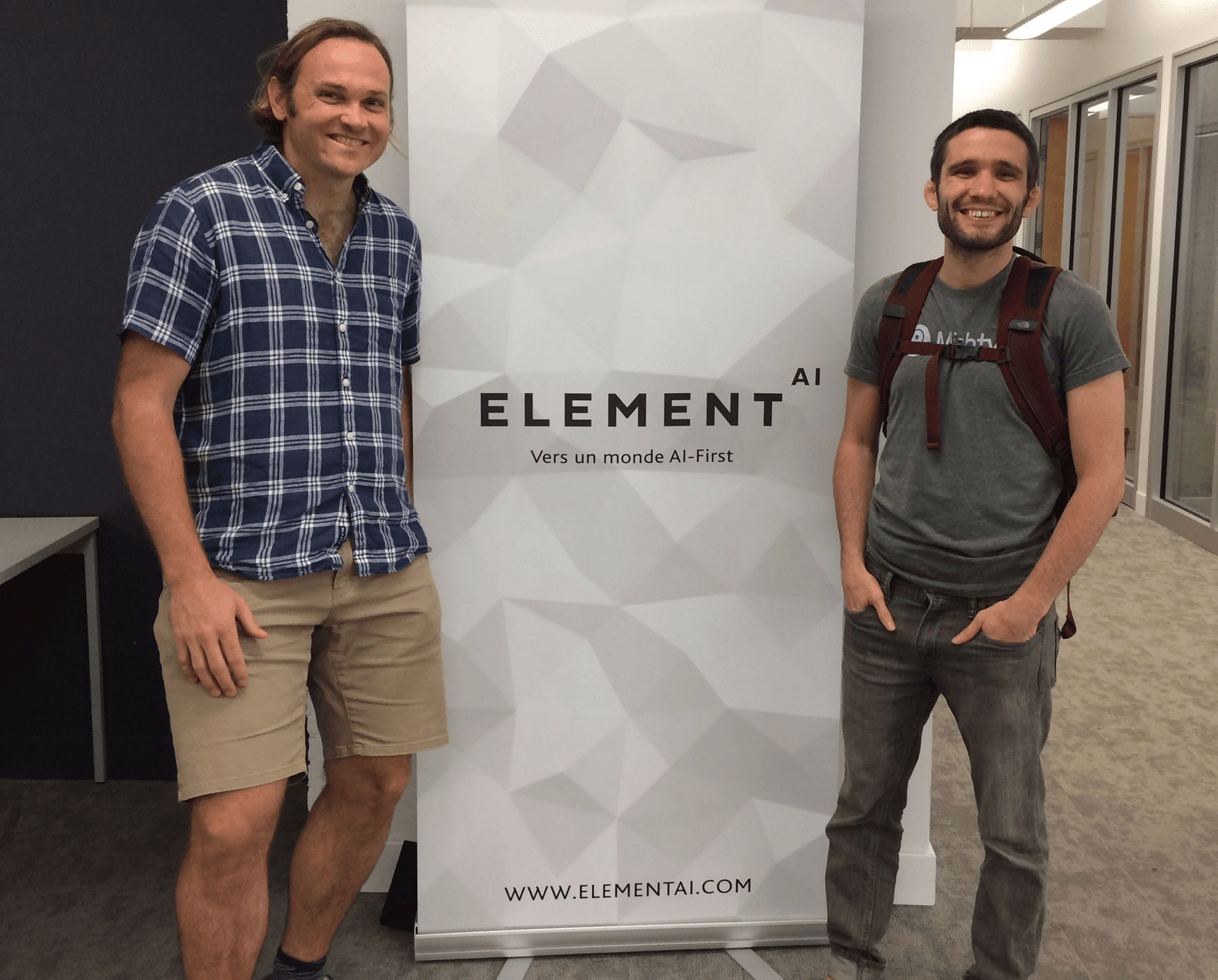
Mauro describes a “no-nonsense realism” about Canadians seems to mesh well with the statements made by other Montreal founders I spoke with. Simard seems to see the same cautious confidence in Canada at large:
Canadians can be very confident when we know we’re very excellent at something and have the data to back it up. Now we’re seeing more confidence and the degree of ambition that’s consulate to that.
This confidence is not contained within the AI scene itself, however; it permeates throughout the entire city. Jeremy Barnes (Chief Architect at Element AI) describes the feeling in Montreal as a result of the spotlight:
AI was hot in 2016/2017…it was the right time to get the money together…it was the right time to pop off. With the launch we tried to showcase Montreal…the public became aware of it’s own expertise in this field…people came to identify with it. Having the “dream team” story of Element AI’s founders [including Dr. Bengio]…tied together the excitement.
Element AI’s launch (and over $100,000,000 fundraise) was indeed a big deal – and can be seen as one of the critical “tipping point” events to cement Montreal’s position as a burgeoning hub. It was an apt time to ask for money. Also, I like the term “pop off” and frankly I’m glad that it’s being used in Canada (though admittedly, Barnes is originally from Australia, go figure).
The gist that I got from speaking with Montrealers is that San Francisco’s bold, brash, do-or-die “raise money and become a billionaire or go broke” culture is still quite foreign in Canada at large (even in the bustling city of Toronto). On the one hand, this might be a good thing, maybe “swinging for the fences” isn’t great for everyone.
At the same time, the GDP of the Bay Area alone is near half of the GDP of the whole of Canada, with less than 20% the population. There is something to be said of this, and while there are worthwhile gripes to be leveled at the Bay Area, it certainly pulls its weight. Montreal seems to be in the process of opening up some of it’s own ambition, allowing for a bit more aspiration and risk-taking than may have been the previous norm.
One might expect that Montreal won’t soon become a city full of get-rich-or-die-trying tech-savvy youngsters anytime soon (and it may not cultivate the brash, enterprising culture of business and power that seem to be the caricature of the United States), but as the tech ecosystem develops and Montreal sees more “wins” the form of fundraising and acquisitions, the path to entrepreneurship will likely become a more popular path. This is the sentiment of the folks I interviews, anywho, and I think it’s a safe guess.
Outside of raising salaries (which has been a bit harder on bootstrapped startups who want to hire tech talent), the influx of investment to Montreal seems to be an aggregate good all around – and almost everyone I spoke with was somewhat relieved to see money coming in. Some of the seemed happy just to know that they could pursue their entrepreneurial ambition in a city they loved, instead of having to move to California. The skiing is certainly better around Montreal.
Investors and customers may be flocking to AI with some undue optimism – a factor that could possibly backfire if expectations get out of hand. I met with Amir Moravej of Botler.ai in a coffee shop downtown on my last full day in Montreal. He told me:
The fact is… we’re still at the beginning of everything here… this is a long-term investment. We’re seeing good progression, but there will be no overnight industry overhauls here. The hype gives the impression of some massive disruption.
Amir doesn’t believe that the hype around AI has made it significantly easier to raise funds. He agrees that AI may have a bit of cache, but doesn’t see investors losing their heads and investing in business that don’t seem to have their fundamentals in order (a good market, a good solution, a good team, etc).
The Impact of French Culture
Being in downtown Montreal is in many ways indistinguishable from being in Lyon or the outskirts of Paris (at least to a Yankee like myself who’s only been in France a few times). The signs are French, the food is (often) French, many of the natives look French, and cigarettes are fashionable (apparently smoking is somewhat more popular in Quebec at large).
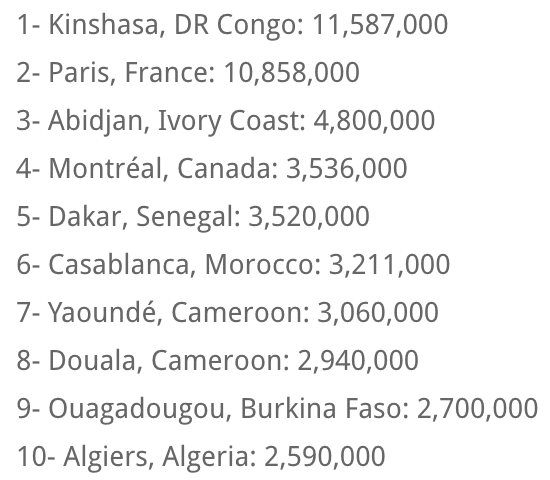
When I was in Montreal, I heard it said twice that Montreal is in fact the second largest French-speaking city outside of Paris.
As it turns out, this is wrong.
Not only is Montreal not #2, but Paris itself is no longer #1.
Size aside, Montreal is certainly the only place in the top 10 Francophone cities that feels a lot like Paris.
Spending a few weeks in the city, it became evident that the French culture expands beyond the delis and coffee shops and into business life.
Many of Montreal’s larger businesses primarily speak French in the office and in many of Quebec’s top universities – including the University of Montreal where Dr. Bengio teaches.
(Interested readers can refer to the Charter of the French Language, otherwise known as Bill 101. This 1977 bill enforces French language use in Quebec – in courts, in labor relations, and in some aspects of commerce. The following is a small snippet from Wikipedia: “Product labels, their instructions, manuals, warranty certificates as well as restaurant menus and wine lists must be in French. Other languages may be used, provided French’s prominence is at least equivalent.”)
In the office of Element AI, I heard about a dozen conversations taking place in english, and another dozen in French – and there seems to be an aggregate kind of cultural pride.
This is unique to me as someone from a tiny town in Rhode Island (the smallest state in the USA), where there is absolutely no cohesive cultural “feel”, no distinct cultural foods, dances, or style. I come from a land of culture-less people (this aptly describes much of the USA, which isn’t necessarily good or bad), so I had to do some more digging to understand how French culture impacts the business, startup, and tech scene in Montreal at large.
A Touchy Subject
While I could provide this caveat for any of the other sections of the article (or any other article on Emerj, for that matter), I think it’s most apt to provide it here:
People do (and say) what it behooves them to do (or say). This doesn’t make them bad, it just is what it is. In the case of French culture, established executives were somewhat reluctant to dive into the subject at depth. Startup founders seemed to be fine to riff about the various pros and cons, but I found it somewhat
Why? I doubt that it’s because French culture in some way helps more established companies and hurts newer ones. Rather, I think that executives who have raised millions of dollars and have larger, intrenched Montreal teams (many of whom may be natives of Montreal, or proud “Montealers” even if foreign-born) may be harmed by stating anything other than warm platitudes about the influence of French culture.
Frankly, I can’t blame them. They gain no “brownie points” from sharing a unique insight about the downsides of the pervasive French culture. Similarly, there would potentially be disappointment from their investors or employees for expressing anything less than exuberant pride in their local culture. Candor, then, is hard to ask for, and has to be teased out in context.
Sure, some people might argue that there are literally no downsides to the French culture, but in all seriousness even parents can often admit both the pros and cons of having children – everything has two sides.
This is why people get frustrated with politicians (they feel they can’t get a straight answer no matter how a questions is phrased). Frustration, however, is not the right response – these are simply people who need to juggle the perceptions and goals of many stakeholders (employees, investors, other journalists, etc), and in understanding this – we can understand that we’d do the same thing in their shoes.
That being said, I wanted to do my best to address frankly (no pun intended) the unique cultural dynamics of Montreal, based on my conversations with locals – and mostly with local entrepreneurs and executives.
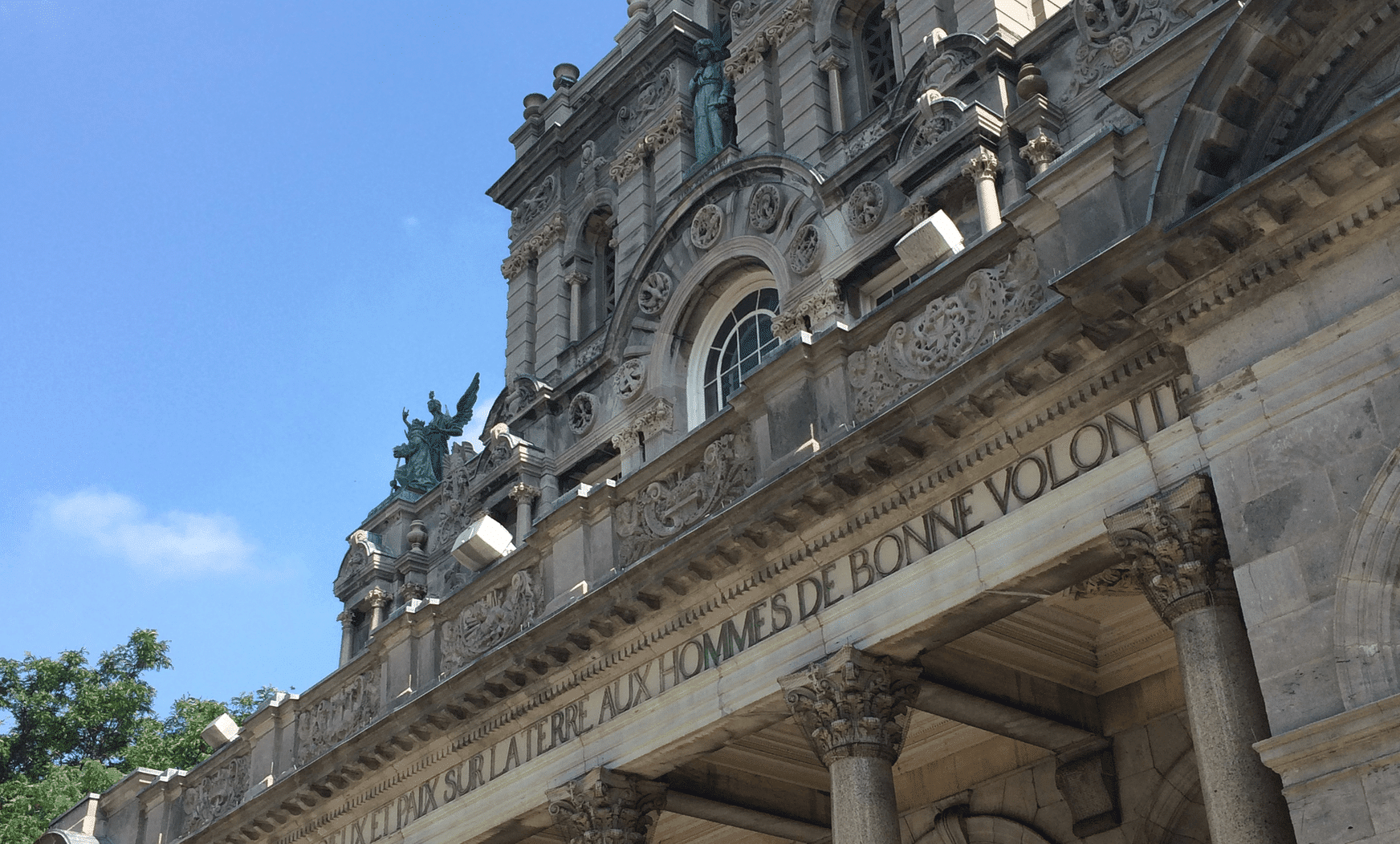
Upsides of French Culture
As we’ll cover in greater depth in the “San Francisco vs Montreal” comparison below, quality of life is something emphasized by many Montrealers as quite important. The arts, cuisine, and the outdoors were frequently brought up in my conversations with locals.
The sense of “balance” feels much more influenced by Europe than the hectic bustle of the American cities not too far below Montreal – such as Boston and New York. Also – there seems to be a bit of pride in “balance.” Just as (prdictably) San Francisco residents might relish in the go-go pace and pure emphasis on cutting-edge tech, many of the Montrealers I spoke with seem proud of their rich cultural life, outdoor exploration, and “community” vibe (something that much of SF – and certainly much of Silicon Valley – lacks).
The restaurants are consistently mentioned to be upsides, too. Nearly 50% of those asked about the pros and cons of the french culture referenced Montreal’s culinary strengths. This seems to be part of the pride in a culturally rich and balanced life that Montreal tends to promote.
Downsides of French Culture
During a 40-minute Uber ride to visit Erudite.ai’s office, I talked with my driver about the influence of french culture in Montreal.
As it turns out he ran a few community websites himself, had an interest in AI, had read some Kurzweil, and was eager to give me his take. Born and raised in Montreal, and the son of a small business owner, he expressed a love for his home city, but a frustration with what he seemed to see as its preoccupation with the status quo.
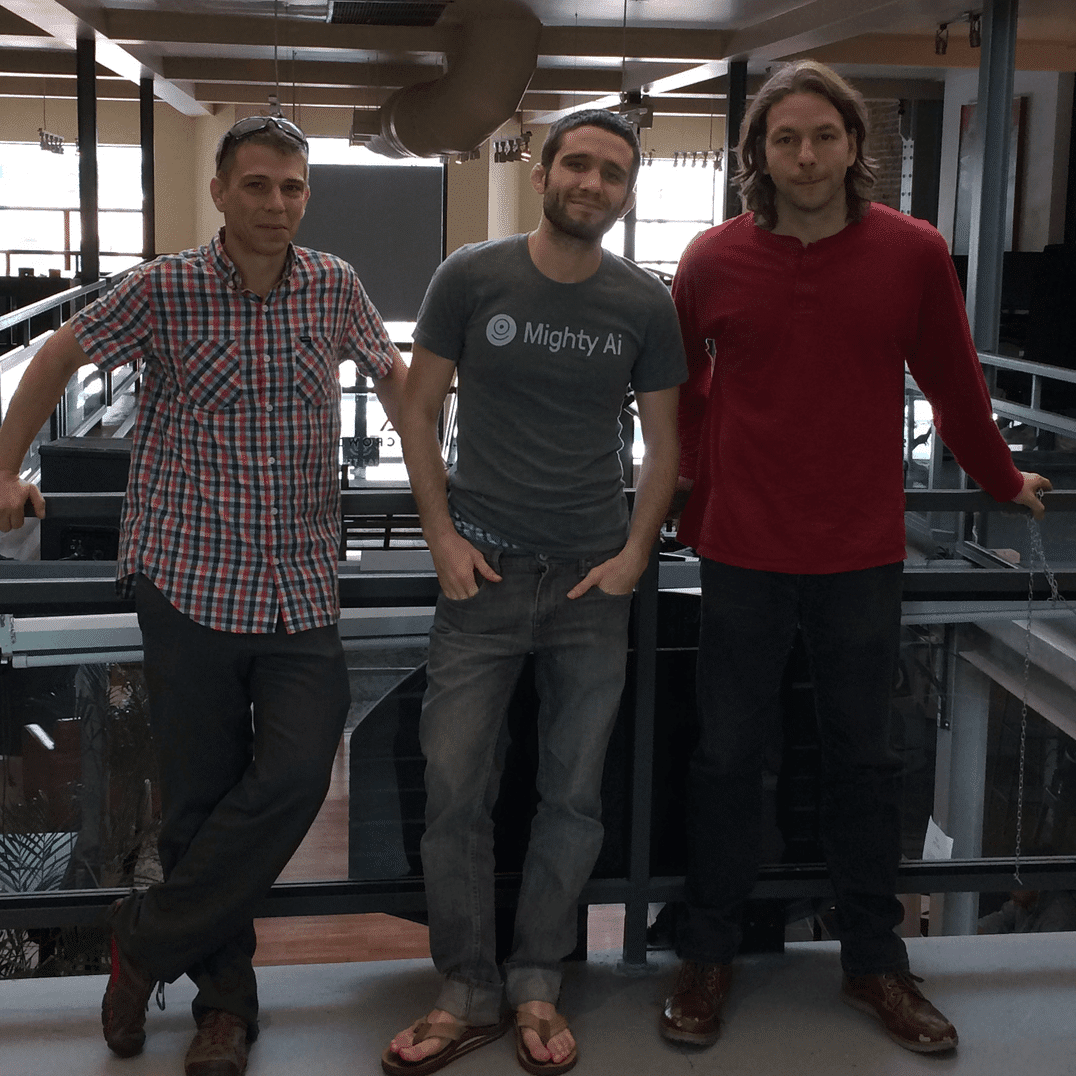
“Companies who want to move here need all their signs, their legal documents, their operations manuals… all translated to French. This is now how it works in Vancouver or Toronto, and I feel like it’s easier for companies to move into those cities.” Hearing him speak it seemed hard to fully ignore the friction involved in the Charter of the French Language, and it’s symbolic representation of the cultural past (possibly opposed to the blazingly-fast-moving present).
Fanoni Mathieu (VP Operations) and run Jean-Philippe Beaudet (CEO) run s3r3nity Technologies, a firm working at the intersection of AI and blockchain. If their names didn’t give it away – they’re about as french as it gets, which is novel and fun for a yankee like myself.
They had an interesting take on cultural difference between Quebec and the USA. “We have no ‘American dream’ here” says Fanoni. He explained that Quebec that people don’t seem to come to Quebec (or Canada in general) for the same of “going big or going home.” Canada seems to have a different appeal to immigrants (past and present) than does the classic “land of opportunity” that the USA has historically represented in foreign minds.
Beaudet and Fanoni go on to explain that having wealth wasn’t necessarily seen by Quebecers as a virtue – and that in fact it often came across as a sign of vice. In their estimation, it is comparatively unusual for a high school or college student in Quebec to express aims of growing a massive company or getting rich. They speculate that maybe this has to do with Montreal being started by the French, not the British – or maybe it has to do with America being primarily Protestant, and Montreal primarily Catholic, but those cultural rabbit-holes seem hard to explore today.
The pair agrees that this mentality is shifting, and that business ambition seems to be more and more appealing and common – particularly among the younger generation that is constantly in contact with the USA via the internet and social media.
All in All
In the Wikipedia listing for The Charter for the French Language (in Quebec), the sub-section on “Criticism” is a full 1308 words, which is longer even than the sub-section outlining the contents of the bill itself. Take that as you may.
It seems evident that some Quebec residents relish in their French heritage, and others do not. While it may be a source of pride for some, and a refreshing bit of charm for others – one could make the argument that the influx of French-speaking talent does not outweigh the trouble with starting and growing a business with Quebec’s language laws. In this sense, it may take a bit more from the tech sector than it gives, perpetuating charm while creating a little drag on innovation.
Only time will tell. All I can say on my end is that when asking about the overt benefits of French culture to the AI executives I spoke with – I heard a lot of “it definitely doesn’t slow us down”, and not a lot of “here’s why it tangibly, overtly benefits our tech and startup scene.” That being said, it hasn’t stopped AI talent from flooding into MILA, and Montreal has plenty more tech growth ahead, it seems.
There’s not much conflict on the issue, however, and Montreal – like much of Canada – is quite safe for a city of it’s size. We can all learn a thing or two from that example. Maybe “nice” is a stereotype worth keeping – I sure think so.
French Itself isn’t a Barrier in the Startup Scene
Regional researchers and entrepreneurs are also feeling a sense of renewed pride for their city as a result of the new attention. There are aspects of Quebecois culture that influence the entrepreneurial and AI scene. Surprisingly, however, one of these ways is not often the city’s bilingualism.
English-speaking researchers and investors should not hesitate to consider Montreal on the expectation of a language barrier. Thomas Jelonek claims, “it is harder for purely French speakers to stay on top of the latest research…not so many companies are boxed in by French; most of these companies are mixed, with their ‘first language’ being French or English.”
Helge Seetzen offers a more asymmetrical experience, asserting that English is still the “linguistic norm” when he says, “basically everyone speaks English. 90% of our people don’t speak any French.” The province at large may skew towards an abundance of French-speakers, but Montreal itself is a unique, internationally-infused entity in which English-speaking researchers and entrepreneurs can easily interact. As Seetzen puts it, “Montreal proper is universally bilingual, so people can function in whatever language they want”.
He goes on to clarify that there are certainly startups that most often use French to communicate, but that he doesn’t encounter them often. He says, “I encounter the ones that operate on an international level, and in order to do that, you function in English.” Seetzen describes TandemLaunch as “hyper-international,” terminology that should be encouraging and reassuring to researchers and investors skeptical of Montreal’s place as a global hub for AI.
Montreal vs. San Francisco – Location Considerations
I found myself having to dig in a little bit with my interview questions to get to the heart of the matter here. In Andrew Carnegie’s unfinished autobiography (not worth the read, in my opinion, as is the case with most autobiography), I recall him taking away two main lessons from traveling the world in his 40s. First, that the God that a certain people believed in was the only true God. Second, that the land one was born in is always the most sacred land.
By circumstance, the interviewees in this series were investors, researchers and entrepreneurs in Montreal – who had chosen to stay there. Not exactly a well-rounded sample of Montreal-born tech entrepreneurs. It’s hard to blame them for being biased (anyone in their shoes would be) – and their perspectives are nonetheless interesting in considering Montreal as a “Bay Area alternative.”
If you were an oil painter in the late 1800s, Paris was the center of gravity, and everyone knew it. If you’re a startup today, you’re told that the Mecca is the Bay Area. Do or die, that’s where it happens. Even for Emerj, moving to SF seemed like an inevitable progression. The investment dollars, and the invest-able companies… are unbelievably well concentrated in the Bay Area – and tech entrepreneurs who don’t move there know full well that they’ll need to have an on-deck answer to “So why haven’t you moved?”
Element AI is one of the firms that helped to bring the crescendo of AI attention on Montreal. Co-founded by seasoned entrepreneur Jean-François Gagné and Bengio himself, Element is mostly focused on applying AI to large, “unsexy” industries – like mining and manufacturing.
“I haven’t heard ‘If you were serious you’d move to California’ in 18 months” says Jeremy Barnes. This seems to be a sign of progress in Montreal, acknowledgement of Montreal’s resources, and a possible realization by even Silicon Valley’s investors that paying $3,000 USD/mo for a crappy apartment may have some downsides. Which takes us into our first major point.
Low Cost of Living
New graduates and startups know all too well the realities of locating to Silicon Valley. The cost of living is extremely high and the job market is saturated. One aspect of the Montreal AI scene that struck us as particularly relevant for our audience is that the cost of living is significantly lower in Montreal. In fact, rent prices in Montreal are almost 80% lower than rent prices in San Francisco (for more comparisons, click here).
Andy Mauro says he’s close to owning his own home, “with a lawn,” he adds. On top of that, he suggests that Montreal’s culture and art world is one that can provide talent and entrepreneurs looking to locate somewhere for research or work something other than “startup life,” as he calls it. He even suggests that a culture such as this ultimately helps in fostering a better company.
Indeed it is almost astronomically cheaper to live in Montreal than San Francisco:
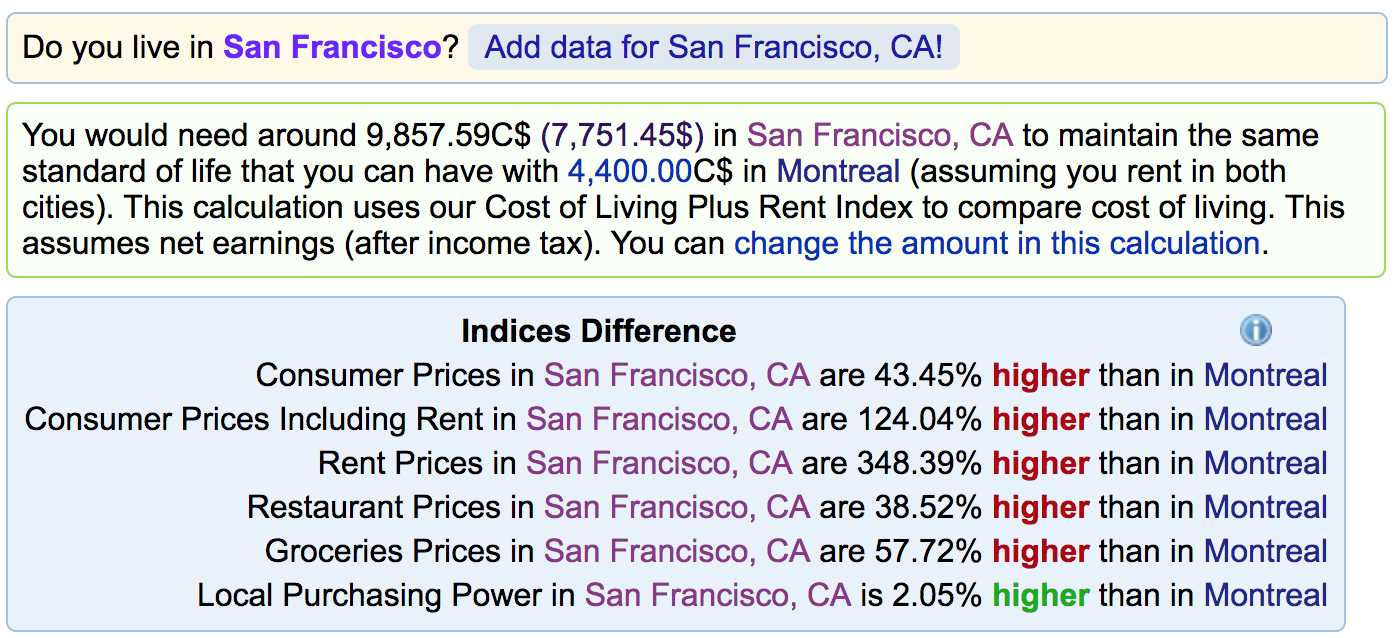
With that said, Fogel insists that entrepreneurs based in Montreal aren’t too different from those based in Silicon Valley aside from that they “tend to look a little more locally and smaller and have fewer connections and so it’s harder to meet the big Bay Area VCs.”
Silicon Valley is still the land of entrepreneurship and tech “density” – and unquestionably still the venture capital hub of the world, and nearly all Montrealers in some way lamented the lagging emphasis on tech investment.
Government Support
A large academic community such as that in Montreal requires regular funding. The Canadian government actually funds a sizeable amount of AI research. Although Boufaden claims the government was less excited about championing AI back in 2010 when she began her work on Keatext, Poirier claims he raised much of the money for Erudite.ai through the Canada Media Fund, a public-private partnership created by the Department of Canadian Heritage.
Andy Mauro, CEO of Automat, a company specializing in conversational marketing and chatbots, claims that when he sets out on business venture, he “gets 70% R&D back from the government.” Furthermore, just his past May, Quebec’s government set aside $100 million dollars for the creation of an AI research cluster. Perhaps it’s unsurprising that Mauro goes on the suggest, “There’s an extremely strong business case for being here.”
Hopes to Montreal’s Future in AI and Innovation
I ended a large portion of my interviews with a question likely to be met with extremely biased responses:
What do you expect for the AI scene in Montreal in the future?
Montreal is a city basking in its newfound recognition – at least in the domain of machine learning. Time will tell if that recognition lasts, but the city has quite a bit going for it with regards to its AI scene. Karam Thomas, founder and CEO of CognitiveChem, a company leveraging AI to help chemists develop safer chemicals, sums this article up nicely with an extremely concise observation:
Montreal’s unique advantage lies in its collaborative research between academia, startups and corporations.
The AI entrepreneurs in Montreal are all well aware that their city has something special going on in its confluence of AI expertise and recent investments from governments, VC, and big business. Exactly how this collaboration shakes out only time will tell.
Andy Mauro hopes that Montreal won’t just become the playground of US tech giants like Google and Facebook, but that it’ll birth it’s own giants. He believes that the “practical” nature of Canadians (and their lack of access to venture capital) has led many promising local firms (like Maluuba, acquired by Microsoft) to sell out as opposed to becoming huge.
For Montreal to build its own large tech firms, it seems critical for the region to encourage entrepreneurship actively, and to get more access for it’s companies. If UMontreal’s grads boldly step out and form their own firms, and the enthusiasm for machine learning stays hot – this may serve to “jumpstart” the ecosystem for building great companies – and indeed this seems to be what’s happening now (fingers crossed, Andy!).
Years of focus on the long-neglected field of machine learning left Quebec (and to some extent, Canada at large) with a wealth of expertise in a domain that – as it turns out – would be loaded as “the next internet” in terms of it’s impact on the economy and business at large. While some Montrealers smile confidently as if they knew it all along, it seems safe to say that for most of them – the inevitable preeminence of machine learning wasn’t written in the stars – and its impact came as a surprise to many of the researchers toiling away in this otherwise little-known field.
By luck or by the direct wooing of fortune herself – the credit for Montreal’s recent machine learning renaissance is in large part due to the long preparing, focused work of it’s researchers and entrepreneurs, who have built a dense cluster of talent in what may be the most valuable skill in business for many decades ahead.
As Mauricio Padilla from Lexalytics put it, “For the first time, investors don’t ask you why you’re in Montreal.” That’s a quite a sea change, and it’s a trend that seems only to be increasing as Silicon Valley’s reputation seems hurt by high rents and Russian social media manipulation – and as the tech world in general scoffs at America’s current political situation.
In speaking with Mauricio, he jestingly said “We are seen differently – I think there’s actually less Canadian jokes these days.” Apparently, Google Trends validates this hunch:
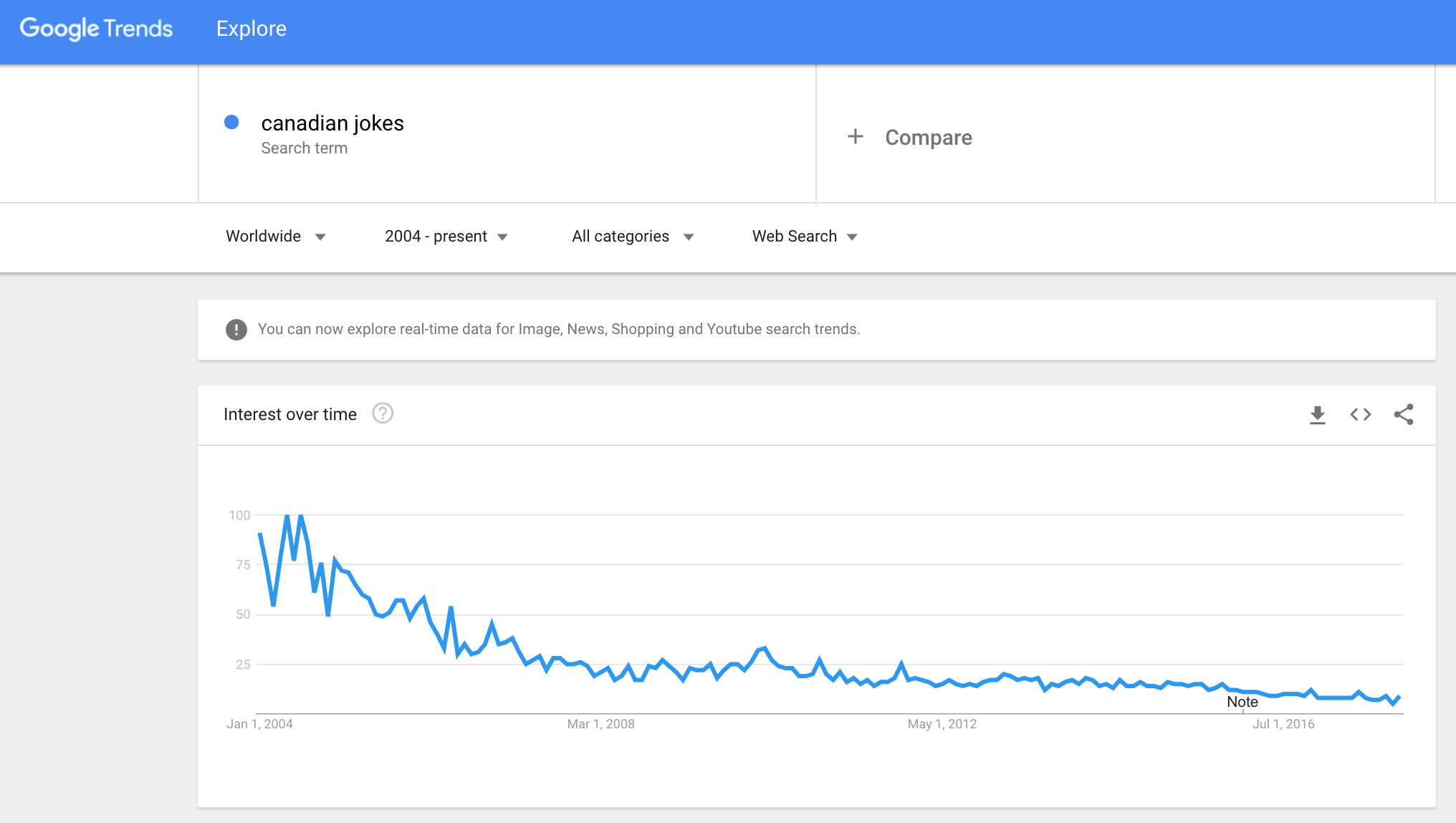
More attention, more investment – less jokes. Only time will tell what the lasting impact will be of this recent barrage of press and investment – in terms of the startup and business ecosystem of Montreal at large.
I can’t help but root for them.
A Thanks to Those Who Made This Piece Possible
This article wouldn’t have happened if it weren’t for the connections and kindness of a bunch of Canadians.
My first email when I knew I would be heading to Montreal was to Yoshua Bengio himself, and he was kind enough to make suggestions to chat Keatext and Imagia.ai when I arrived, which were some of my first interviews – both great ones. Matt Fogel was kind enough to connect me with some Montreal-based investor folks, and suggested some other interesting companies, and Andy Mauro and Caroline Bourbonniere (of Element AI) extended the same kindness.
I’ll close out with a full list of those who took the time to chat during this little Canadian AI adventure. Many of these Montrealers have also been guests on our artificial intelligence podcast, and so I’ve included links to those episodes as well:
- Dr. Yoshua Bengio, head of the Montreal Institute for Learning Algorithms (Yoshua interview here, one of our most popular podcast episodes of all time)
- Andy Mauro, CEO and Co-founder, Automat
- Thomas Jelonek, Founder, Envision.AI (Thomas interview here)
- Jeremy Barnes, Chief Architect, Element AI
- Fanoni Mathieu, VP of Operations, s3r3nity
- Jean-Philippe Beaudet, Founder and CEO, s3r3nity
- Vince Iannotti, Sr. Director Technical Product Management, Nuance Communications
- Ritika Dutt, Co-Founder & Chief Operating Officer, Botler.ai
- Amir Moravej, Founder, Botler.ai
- Helge Seetzen, CEO, TandemLaunch
- Narjes Boufaden, CEO and Founder, Keatext (Narjes interview here)
- Charles-Olivier Simard, CTO and Co-founder, Keatext
- Matt Fogel, President, Fuzzy.ai (Interview here with Fuzzy.ai’s Evan Prodromou)
- Mauricio Padilla, President, Lexalytics (Interview here with Lexalytics’ Paul Barba)
- Patrick Poirier, CEO and Founder, Erudite.AI
- Alexandre Le Bouthillier, Founder, Imagia.AI
- Pierre Boivin, President and Chief Executive Officer, Claridge, Inc.
Header image credit: Hôtels Gouverneur




